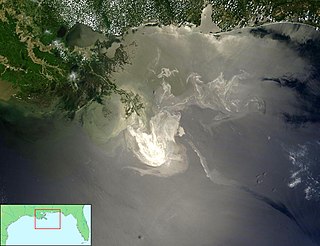Deepwater Horizon was a drilling rig that sank in the Gulf of Mexico on 22 April 2010.
Deepwater Horizon may also refer to:
Deepwater may refer to ocean water in the abyssal zone, hadal zone, or other deep ocean zones.
Unified command may refer to:
DWH can stand for:

Deepwater Horizon was an ultra-deepwater, dynamically positioned, semi-submersible offshore drilling rig owned by Transocean and operated by BP. On 20 April 2010, while drilling at the Macondo Prospect, a blowout caused an explosion on the rig that killed 11 crewmen and ignited a fireball visible from 40 miles (64 km) away. The fire was inextinguishable and, two days later, on 22 April, the Horizon sank, leaving the well gushing at the seabed and causing the largest marine oil spill in history.
National Commission may refer to:
Deepwater drilling, or deep well drilling, is the process of creating holes in the Earth's crust using a drilling rig for oil extraction under the deep sea. There are approximately 3400 deepwater wells in the Gulf of Mexico with depths greater than 150 meters.

The Deepwater Horizon oil spill was an industrial disaster that began on April 20, 2010 off of the coast of the United States in the Gulf of Mexico on the BP-operated Macondo Prospect, considered to be the largest marine oil spill in the history of the petroleum industry and estimated to be 8 to 31 percent larger in volume than the previous largest, the Ixtoc I oil spill, also in the Gulf of Mexico. The United States federal government estimated the total discharge at 4.9 MMbbl. After several failed efforts to contain the flow, the well was declared sealed on 19 September 2010. Reports in early 2012 indicated that the well site was still leaking. The Deepwater Horizon oil spill is regarded as one of the largest environmental disasters in world history.
There have been three major oil spills in the Gulf of Mexico:
2010 oil spill may refer to:

The Deepwater Horizon drilling rig explosion was an April 20, 2010 explosion and subsequent fire on the Deepwater Horizon semi-submersible mobile offshore drilling unit, which was owned and operated by Transocean and drilling for BP in the Macondo Prospect oil field about 40 miles (64 km) southeast off the Louisiana coast. The explosion and subsequent fire resulted in the sinking of the Deepwater Horizon and the deaths of 11 workers; 17 others were injured. The same blowout that caused the explosion also caused an oil well fire and a massive offshore oil spill in the Gulf of Mexico, considered the largest accidental marine oil spill in the world, and the largest environmental disaster in United States history.
Gulf oil spill may refer to:
The National Commission on the BP Deepwater Horizon Oil Spill and Offshore Drilling is a bipartisan presidential commission, established by Executive Order 13543 signed by Barack Obama on May 21, 2010, that is "tasked with providing recommendations on how the United States can prevent and mitigate the impact of any future spills that result from offshore drilling." It came about as a result of the April 2010 Deepwater Horizon oil spill. The first public hearings, held on July 12 and 13, 2010 in New Orleans, included scheduled testimony from Federal government officials and representatives of BP on the status of the spill and clean-up efforts, as well as from local officials, community leaders, and scientists on the economic, cultural and ecological impacts of the oil spill on Gulf Coast communities and ecosystems.
Great Oil Spill of 2010 may refer to:

The Unified Command provides Incident Command System/Unified Command (ICS) for coordinating response to the Deepwater Horizon oil spill.
Worst Case Discharge (WCD) is a calculation used by the Bureau of Ocean Energy Management, Regulation and Enforcement to determine the maximum flow rate for an offshore oil well in the event of an oil spill. WCD first came to prominence in the aftermath of the Deepwater Horizon Oil Spill to determine potential liability if another oil spill were to occur.
Deepwater Horizon oil spill consequences may refer to:
The Health consequences of the Deepwater Horizon oil spill are health effects related to the explosion of the Deepwater Horizon offshore drilling rig in the Gulf of Mexico on April 20, 2010. An oil discharge continued for 84 days, resulting in the largest oil spill in the history of the petroleum industry, estimated at approximately 206 million gallons. The spill exposed thousands of area residents and cleanup workers to risks associated with oil fumes, particulate matter from Controlled burns, volatile organic compounds (VOCs), polycylic aromatic hydrocarbons (PAHs), and heavy metals.

The GuLF Study, or Gulf Long-term Follow-up Study, is a five-year research project examining the human-health consequences of the Deepwater Horizon oil spill in April 2010. The spill followed an explosion on a drilling rig leased by BP, the British oil company, and led to the release of over four million barrels of oil into the Gulf of Mexico, 48 miles off the coast of Louisiana in the United States.

Deepwater Horizon is a 2016 American biographical disaster film based on the Deepwater Horizon explosion and oil spill in the Gulf of Mexico. Peter Berg directed it from a screenplay by Matthew Michael Carnahan and Matthew Sand. It stars Mark Wahlberg, Kurt Russell, John Malkovich, Gina Rodriguez, Dylan O'Brien, and Kate Hudson. It is adapted from "Deepwater Horizon's Final Hours", a December 25, 2010 article in The New York Times written by David Barstow, David Rohde, and Stephanie Saul.
The Big Fix may refer to: